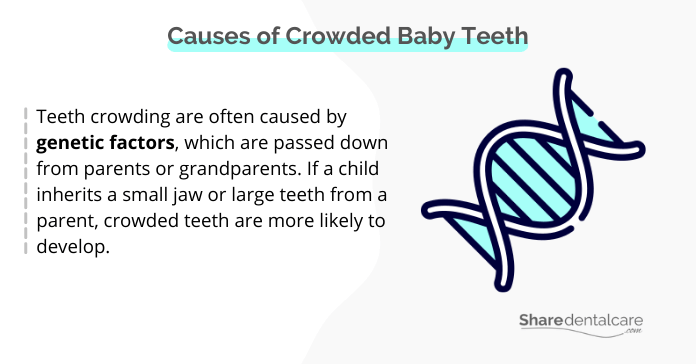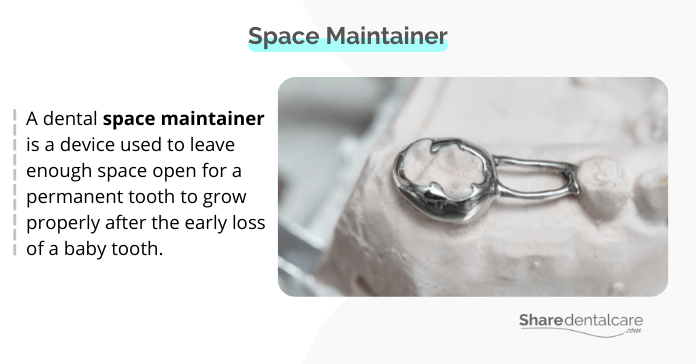It’s common for parents to be concerned about crowded baby teeth. After all, crowded teeth can cause a number of problems down the road, including smile problems and difficulty chewing. In this blog post, We will discuss what causes crowded baby teeth, when you should be concerned, and what to do about it. We will also provide some tips to help you prevent crowded baby teeth.
What Causes Crowded Baby Teeth?
Genetic factors are the primary cause of crowded baby teeth. If you or your parents have crowded teeth, it’s likely that your child will as well. For example, if the baby inherits a small jaw or large teeth from either parent, crowded teeth are more likely to develop.
Other factors that can contribute to baby teeth misalignment include:
- Thumb sucking because it puts pressure on the baby’s teeth.
- Prolonged use of a pacifier
- Mouth breathing
- Tongue thrusting
- Teeth that are too large
- Trauma to the teeth or jaw

Does Having Crowded Baby Teeth Mean My Child Will Have Crowded Permanent Teeth?
Parents usually start to worry when they see their baby’s teeth are crowded. It’s important to keep in mind that crowded baby teeth are common and do not necessarily mean your child will have crowded permanent teeth.
You can’t predict how your child’s permanent teeth will grow and develop based on the appearance of their baby teeth. However, small jaw size and early loss of baby teeth can increase the risk of permanent teeth crowding. So, if you’re concerned about your baby’s teeth, it’s best to talk to your child’s dentist or orthodontist. They will tell you if there is a reason to be concerned and develop a treatment plan if needed.
What To Do About Crowded Baby Teeth?
In most cases, crowded baby teeth will resolve on their own as the child’s mouth grows and develops. Also, baby teeth crowding doesn’t necessarily mean your child’s permanent teeth will be misaligned. However, that doesn’t mean you should ignore the problem.
Talk to your child’s dentist or orthodontist. They can identify potential problems that may affect the alignment of permanent teeth, such as the early loss of baby teeth and jaw misalignment. In this case, your child’s orthodontist may suggest:
- Observation: the orthodontist will monitor your child’s teeth as they grow and develop. They may take x-rays to get a better idea of how the permanent teeth are growing.
- Space Maintenance: In the case of early loss of baby teeth, the dentist may place a space maintainer to hold the space open for the permanent teeth.
- Orthodontic Treatment: In some cases, the dentist may recommend orthodontic treatment to correct the problem. For example, your child’s orthodontist may recommend an orthopedic facemask, also known as reverse-pull headgear, to help guide the growth of your child’s jaw.

How Do I Prevent Crowding of My Child’s Teeth?
Unfortunately, you may not be able to prevent the crowding of baby teeth because it’s often caused by genetic factors. However, there are some things you can do to reduce the risk of primary and permanent teeth misalignment:
- Encourage your child to stop thumb-sucking or using a pacifier by a certain age. The earlier you can get them to stop, the better. If you can’t get them to stop on their own, you may need to talk to your child’s dentist or orthodontist about ways to break the habit.
- Clean your baby’s mouth as soon as the first tooth appears to prevent baby bottle teeth rot. Use a soft-bristled toothbrush designed for children under 2 years.
- Make sure your child brushes and flosses their teeth regularly. This will help to keep their teeth and gums healthy.
- Limit sugary drinks and snacks. Too much sugar can cause tooth decay, which can lead to the early loss of baby teeth.
- Schedule regular dental checkups. This will help ensure that your child’s teeth are healthy and growing properly.
You can read more about treatment options for lower teeth crowding.
Conclusion
Crowded baby teeth usually occur due to genetic factors, and do not necessarily mean your child will have crowded permanent teeth. However, it’s important to talk to your child’s dentist or orthodontist. They will be able to identify any potential problems that may affect the alignment of the permanent teeth, such as jaw misalignment. Your child’s orthodontist will monitor your child’s teeth as they grow and develop. Also, they will develop a treatment plan if needed.